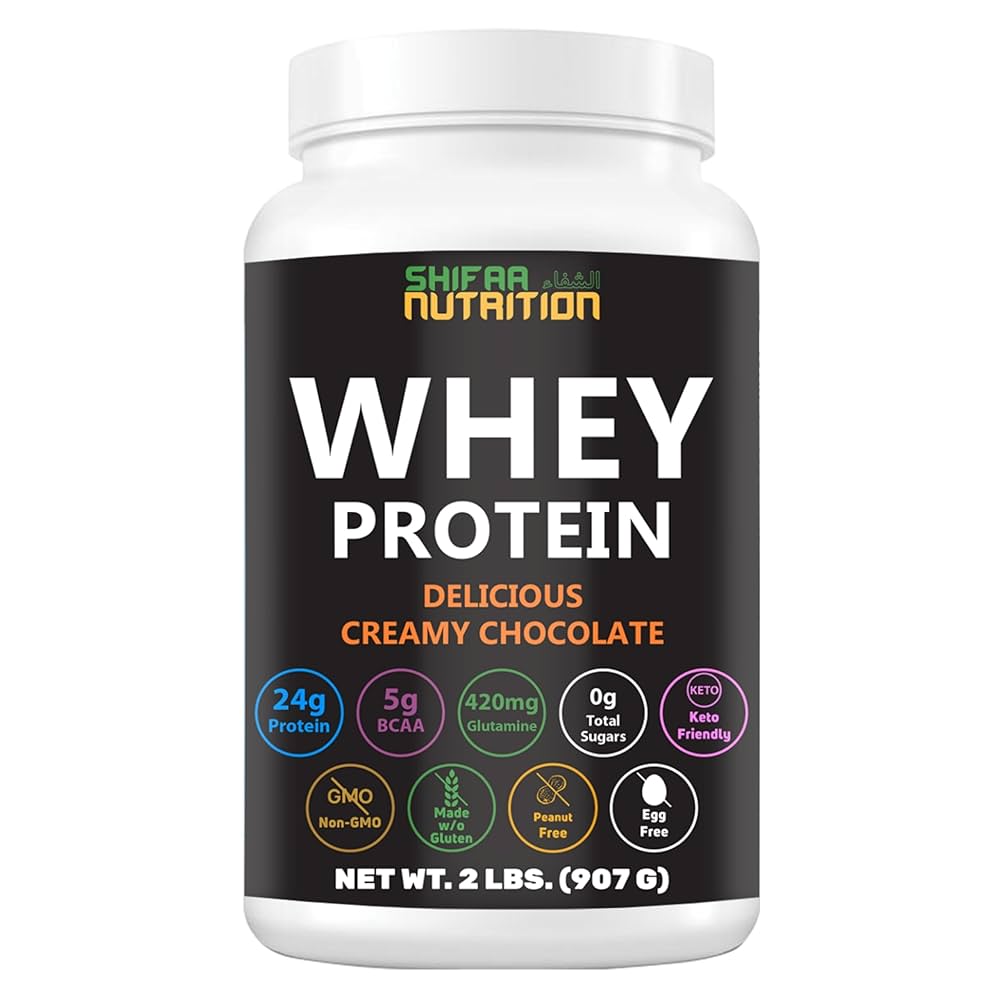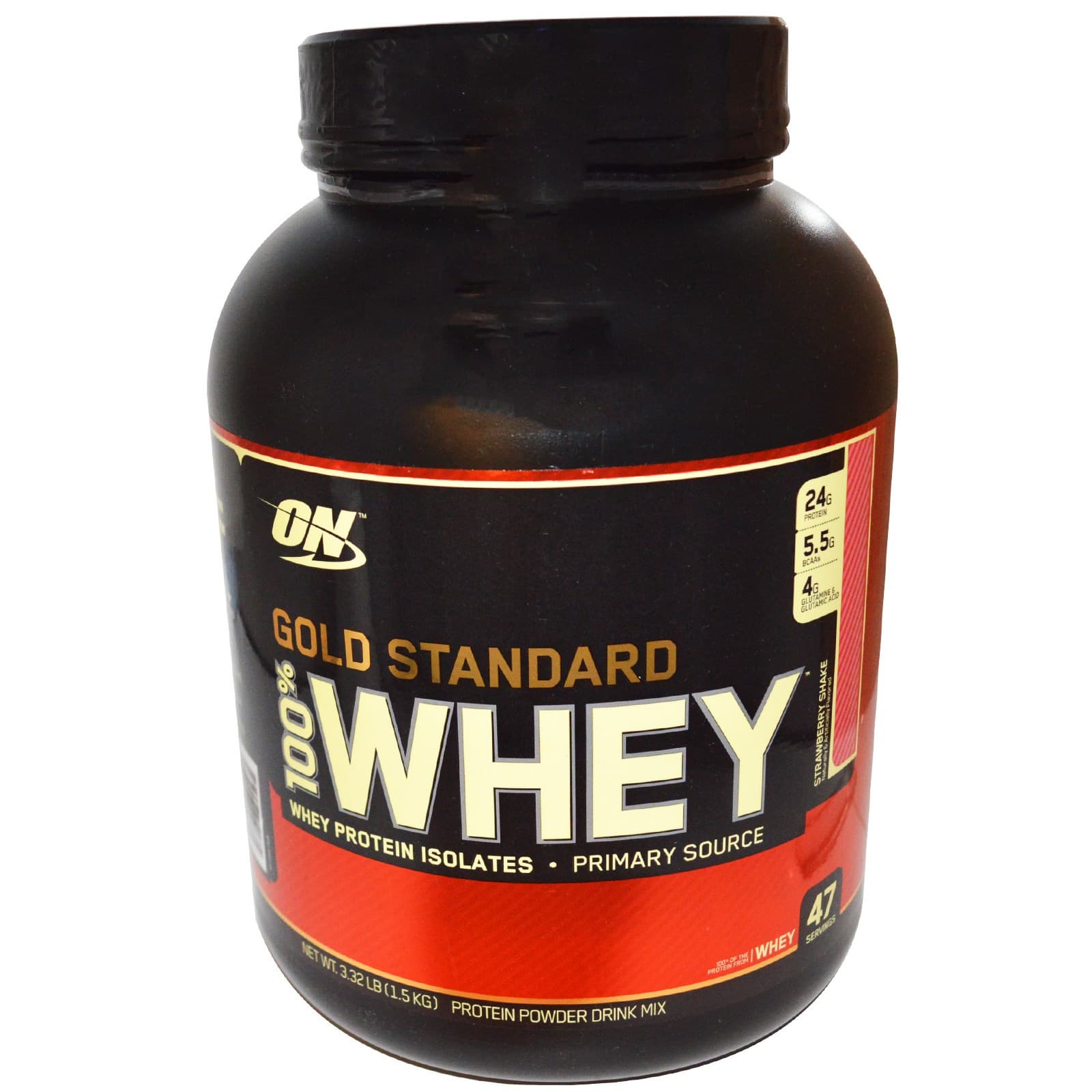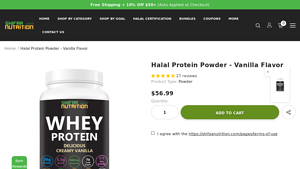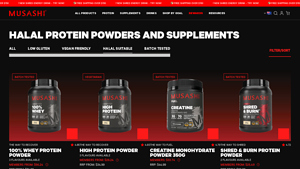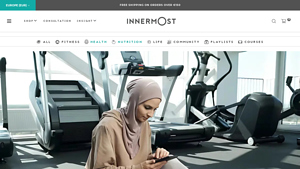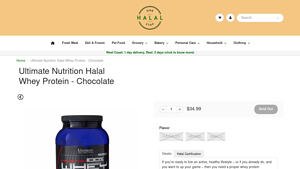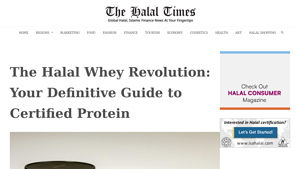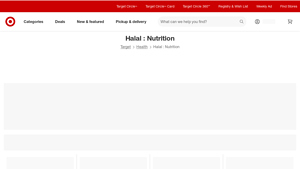A Deep Dive into Halal Whey Protein Solution
Introduction: Navigating the Global Market for halal whey protein
In the ever-evolving landscape of nutritional supplements, sourcing halal whey protein presents a unique challenge for international B2B buyers. The demand for high-quality, ethically produced whey protein is surging, particularly among Muslim consumers who require assurance that their dietary choices align with halal standards. This guide serves as a comprehensive resource, addressing key considerations such as types of halal whey protein, their applications in sports nutrition and food industries, effective supplier vetting processes, and cost analysis.
By navigating the complexities of halal certification, ingredient sourcing, and production practices, this guide empowers buyers from Africa, South America, the Middle East, and Europe—specifically Germany and Vietnam—to make informed purchasing decisions. We delve into the specific characteristics that distinguish halal whey protein from conventional options, ensuring compliance with dietary laws while meeting the nutritional needs of diverse consumer bases.
Furthermore, we highlight the importance of transparency in the supply chain and the role of reputable certification bodies, providing insights that facilitate trust and reliability in your sourcing strategy. Whether you are looking to enhance your product offerings or cater to a growing market segment, this guide is designed to equip you with the knowledge needed to thrive in the global market for halal whey protein.
Understanding halal whey protein Types and Variations
| Type Name | Key Distinguishing Features | Primary B2B Applications | Brief Pros & Cons for Buyers |
|---|---|---|---|
| Halal Whey Protein Isolate | Higher protein content (90%+), lower lactose and fat levels. | Sports nutrition, fitness supplements. | Pros: Pure protein source, quick absorption. Cons: Higher cost compared to concentrates. |
| Halal Whey Protein Concentrate | Contains 70-80% protein, retains some fats and carbohydrates. | General health supplements, meal replacements. | Pros: More economical, good flavor. Cons: Higher lactose content may not suit all consumers. |
| Halal Hydrolyzed Whey Protein | Pre-digested for faster absorption, often used in recovery. | Post-workout recovery products. | Pros: Fast absorption, less allergenic. Cons: Typically more expensive and less flavorful. |
| Halal Casein Protein | Slow-digesting, ideal for sustained protein release. | Meal replacements, overnight recovery. | Pros: Prolongs amino acid release. Cons: Not suitable for immediate post-workout recovery. |
| Plant-Based Halal Protein | Derived from sources like pea or rice, offers a vegan option. | Vegan nutrition, allergy-friendly products. | Pros: Suitable for vegans, hypoallergenic. Cons: Generally lower protein content compared to whey. |
What Are the Key Characteristics of Halal Whey Protein Isolate?
Halal Whey Protein Isolate is distinguished by its high protein concentration, typically exceeding 90%, and minimal levels of fats and carbohydrates. This makes it an ideal choice for athletes and fitness enthusiasts looking to enhance muscle recovery and growth without additional calories. When purchasing, B2B buyers should consider the sourcing of the whey and ensure the product is certified Halal by a reputable organization to cater to the Muslim market effectively.
How Does Halal Whey Protein Concentrate Differ from Isolate?
Halal Whey Protein Concentrate contains about 70-80% protein and retains some beneficial fats and carbohydrates, making it a more cost-effective option for businesses. It is versatile and can be used in a wide range of products, from protein bars to smoothies. Buyers should evaluate the lactose content, as higher levels may not be suitable for all consumers, especially those with lactose intolerance.
What Are the Benefits of Halal Hydrolyzed Whey Protein?
Halal Hydrolyzed Whey Protein is pre-digested, allowing for rapid absorption, which is particularly beneficial for post-workout recovery. This type is often used in specialized recovery supplements aimed at serious athletes. While its price point is generally higher, the faster absorption rate can justify the cost for B2B buyers focused on performance-oriented products.
Why Choose Halal Casein Protein for Specific Applications?
Halal Casein Protein is a slow-digesting protein, making it suitable for sustained amino acid release, particularly beneficial for overnight recovery or meal replacements. It is ideal for businesses targeting consumers who prefer a prolonged protein source. However, B2B buyers should note that it may not be the best option for immediate post-workout recovery due to its slower absorption rate.
What Makes Plant-Based Halal Protein an Attractive Option?
Plant-Based Halal Protein appeals to a growing segment of consumers seeking vegan and hypoallergenic options. Derived from sources like peas or rice, these proteins typically have lower overall protein content compared to whey. B2B buyers should consider the market demand for plant-based products and the potential for diversification in their offerings while ensuring that these products meet Halal certification standards.
Key Industrial Applications of halal whey protein
| Industry/Sector | Specific Application of halal whey protein | Value/Benefit for the Business | Key Sourcing Considerations for this Application |
|---|---|---|---|
| Food & Beverage | Protein-enriched beverages and snacks | Enhances product offerings and meets health trends | Ensure halal certification and clean ingredient sourcing |
| Sports Nutrition | Post-workout recovery supplements | Supports muscle recovery and attracts fitness-focused consumers | Verify formulation compliance with halal standards |
| Health & Wellness | Dietary supplements for weight management | Appeals to health-conscious consumers | Assess sourcing of all ingredients for halal compliance |
| Bakery & Confectionery | Fortified baked goods and protein bars | Increases nutritional profile and market differentiation | Confirm halal certification of all additives and flavors |
| Infant & Toddler Foods | Nutritional formulas and snacks for infants | Meets dietary needs of halal-observant families | Source from certified suppliers to ensure compliance |
How is Halal Whey Protein Used in the Food & Beverage Industry?
In the food and beverage sector, halal whey protein is increasingly incorporated into protein-enriched beverages and snacks. These products cater to the growing consumer demand for healthier options, particularly among health-conscious individuals and fitness enthusiasts. By using halal whey protein, businesses can enhance their product offerings while ensuring compliance with dietary laws, thus expanding their market reach. For international buyers, it’s essential to ensure that all ingredients are halal certified and sourced from reputable suppliers to maintain product integrity.
What Role Does Halal Whey Protein Play in Sports Nutrition?
Halal whey protein is a popular choice in the sports nutrition industry, particularly in post-workout recovery supplements. It provides essential amino acids that aid muscle recovery and growth, making it attractive to athletes and fitness enthusiasts. Companies focusing on this segment must verify that their formulations adhere to halal standards, including the sourcing of rennet and other additives. Meeting these requirements allows businesses to tap into a niche market that values both performance and dietary compliance.
How is Halal Whey Protein Beneficial in Health & Wellness Products?
In the health and wellness sector, halal whey protein is often included in dietary supplements aimed at weight management and overall health. These products appeal to consumers who prioritize clean, high-quality ingredients that align with their dietary beliefs. B2B buyers in this industry should ensure that all components of their formulations are halal certified, including flavorings and emulsifiers. This not only ensures compliance but also builds trust with a growing demographic of halal-conscious consumers.
How Can Halal Whey Protein Enhance Bakery & Confectionery Products?
The bakery and confectionery industry is leveraging halal whey protein to create fortified baked goods and protein bars. This incorporation increases the nutritional profile of products, catering to consumers seeking healthier indulgences. For businesses, it’s critical to confirm that all additives and flavors used in these products are halal certified to avoid any compliance issues. Sourcing from trusted suppliers can also help maintain product quality and consumer confidence.
Why is Halal Whey Protein Important for Infant & Toddler Foods?
Halal whey protein is essential in formulating nutritional products for infants and toddlers, ensuring that dietary needs are met for halal-observant families. The inclusion of high-quality protein supports growth and development during crucial early stages. For B2B buyers in this sector, sourcing from certified suppliers is imperative to guarantee compliance with halal standards and to provide peace of mind to parents regarding the safety and integrity of the products they choose for their children.
3 Common User Pain Points for ‘halal whey protein’ & Their Solutions
Scenario 1: Navigating Halal Certification Complexities
The Problem: B2B buyers often encounter difficulties in verifying the Halal certification of whey protein products. The certification process can be complex and varies significantly across regions. Buyers may find themselves unsure whether a product meets their market’s specific Halal requirements, leading to potential compliance issues, reputational risk, and financial loss if they inadvertently source non-compliant products. This challenge is particularly acute for companies targeting diverse markets like Africa, the Middle East, and Europe, where Halal standards may differ.
The Solution: To overcome this issue, B2B buyers should establish a comprehensive verification process for Halal certification. Start by sourcing products from reputable suppliers known for transparency in their certification status. Request detailed documentation from suppliers that outlines their Halal certification, including the certifying body and the specific standards followed. Additionally, consider partnering with local Halal certification organizations in your target markets to gain insights into compliance requirements and to ensure that your supply chain adheres to local standards. Regular audits and checks on your suppliers can further mitigate risks and provide peace of mind.
Scenario 2: Addressing Ingredient Transparency Concerns
The Problem: Another significant pain point for B2B buyers is the lack of transparency regarding ingredient sourcing and manufacturing processes. Many whey protein products may contain additives or flavorings that are not Halal-compliant, leading to distrust among consumers. Buyers may struggle to find reliable suppliers who can guarantee that their products are free from non-Halal ingredients, which can ultimately affect customer satisfaction and brand loyalty.
The Solution: To tackle this challenge, B2B buyers should prioritize suppliers that offer a clean ingredient profile. Engage in discussions with manufacturers about their sourcing practices, particularly concerning rennet and flavorings. Request samples for independent testing to verify ingredient compliance. Additionally, implementing a rigorous supplier evaluation process can help identify those who align with your values regarding ingredient transparency. Consider developing long-term relationships with a select group of trusted suppliers who consistently demonstrate integrity in their sourcing and production practices. This approach not only ensures product compliance but also builds a reliable supply chain.
Scenario 3: Overcoming Flavor and Taste Issues
The Problem: Flavor and taste can be significant barriers when sourcing Halal whey protein, particularly for manufacturers looking to create appealing products for end consumers. Many Halal-certified whey proteins are criticized for having unpleasant aftertastes or lacking the desired flavor profiles. This can result in product rejection by consumers, impacting sales and damaging brand reputation.
The Solution: To combat flavor-related issues, B2B buyers should conduct thorough market research to understand consumer preferences regarding taste and texture. Collaborate with suppliers who specialize in flavor innovation and who have a track record of producing well-received products. It’s advisable to request product samples and conduct taste tests with focus groups before making a bulk purchase. Additionally, consider investing in R&D to develop unique flavor profiles that resonate with your target demographic. By focusing on flavor quality and consumer feedback, you can create products that stand out in a competitive market, ultimately leading to higher customer satisfaction and loyalty.
Strategic Material Selection Guide for halal whey protein
What Are the Key Materials Used in Halal Whey Protein Production?
When selecting materials for halal whey protein production, several factors must be considered to ensure compliance with halal standards, product performance, and market preferences. Below, we analyze four common materials used in the formulation of halal whey protein, focusing on their properties, advantages, disadvantages, and considerations for international B2B buyers.
1. Whey Protein Concentrate (WPC)
Key Properties: Whey protein concentrate typically contains 70-80% protein content and is rich in bioactive compounds. It has excellent solubility and emulsification properties, making it suitable for various applications.
Pros & Cons: WPC is relatively cost-effective compared to whey protein isolate (WPI). It retains more of the beneficial nutrients found in whey, such as immunoglobulins and lactoferrin. However, its higher fat and carbohydrate content may not align with certain dietary preferences, particularly for those seeking low-carb or low-fat options.
Impact on Application: WPC is ideal for protein shakes, bars, and baked goods. Its flavor profile is versatile, but the presence of lactose may be a concern for lactose-intolerant consumers.
Considerations for International Buyers: Buyers from regions like the Middle East and Africa should verify the halal certification of the WPC source, especially regarding the rennet used in cheese production. Compliance with local food safety standards is also essential.
2. Whey Protein Isolate (WPI)
Key Properties: Whey protein isolate contains 90% or more protein and is processed to remove most fats and carbohydrates. It has excellent digestibility and is low in lactose.
Pros & Cons: WPI is favored for its high protein content and minimal lactose, making it suitable for a broader audience, including those with lactose intolerance. However, it is more expensive to produce, which can affect pricing for B2B buyers.
Impact on Application: Ideal for high-protein formulations, WPI is commonly used in sports nutrition products and supplements aimed at serious athletes. Its neutral taste allows for easy incorporation into various recipes.
Considerations for International Buyers: Buyers should ensure that the WPI is sourced from halal-certified producers and complies with international standards such as ISO and HACCP. The higher cost may be a consideration for bulk purchases in price-sensitive markets.
3. Flavoring Agents
Key Properties: Flavoring agents, whether natural or artificial, are crucial for enhancing the taste of whey protein products. They must be free from alcohol and non-halal animal derivatives to maintain compliance.
Pros & Cons: Natural flavorings are generally preferred for their clean label appeal, but they can be more expensive and less stable than artificial alternatives. Artificial flavorings may offer consistency and lower costs but can raise concerns among health-conscious consumers.
Impact on Application: Flavoring agents significantly influence consumer acceptance and marketability. They are essential for products aimed at younger demographics or those seeking indulgent flavors.
Considerations for International Buyers: Buyers should prioritize suppliers who can provide transparency regarding ingredient sourcing and halal certification. This is particularly important in regions with strict dietary laws, such as the Middle East.
4. Emulsifiers
Key Properties: Emulsifiers help stabilize mixtures of oil and water, improving texture and mouthfeel. Common emulsifiers include lecithin and mono- and diglycerides, which must be halal-certified.
Pros & Cons: Emulsifiers enhance product stability and shelf life, making them valuable in formulations. However, sourcing halal-certified emulsifiers can be challenging, and some may introduce additional costs.
Impact on Application: Emulsifiers are crucial in ready-to-drink protein shakes and bars, where texture and consistency are vital for consumer satisfaction.
Considerations for International Buyers: Buyers should ensure that emulsifiers meet local regulations and halal standards. The complexity of sourcing halal emulsifiers may require closer collaboration with suppliers to ensure compliance.
Summary Table of Material Selection for Halal Whey Protein
| Material | Typical Use Case for halal whey protein | Key Advantage | Key Disadvantage/Limitation | Relative Cost (Low/Med/High) |
|---|---|---|---|---|
| Whey Protein Concentrate (WPC) | Protein shakes, bars, baked goods | Cost-effective, retains beneficial nutrients | Higher fat and carb content | Medium |
| Whey Protein Isolate (WPI) | Sports nutrition products | High protein content, low lactose | Higher production cost | High |
| Flavoring Agents | Enhancing taste in protein products | Improves consumer acceptance | Natural flavors can be costly | Medium to High |
| Emulsifiers | Ready-to-drink shakes, bars | Enhances stability and texture | Sourcing halal-certified emulsifiers can be complex | Medium |
This guide provides a comprehensive overview of the materials involved in halal whey protein production, helping international B2B buyers make informed decisions that align with their market needs and compliance requirements.
In-depth Look: Manufacturing Processes and Quality Assurance for halal whey protein
What Are the Main Stages in the Manufacturing Process of Halal Whey Protein?
The manufacturing process of halal whey protein involves several critical stages to ensure that the final product meets both nutritional standards and halal certification requirements. Here’s a breakdown of the main stages:
Material Preparation
The journey of halal whey protein begins with the careful selection of raw materials. High-quality milk, preferably sourced from halal-certified farms, is essential. The milk is subjected to initial testing for purity and composition, ensuring it is free from contaminants. Additionally, the rennet used in cheese production must be verified as halal, either microbial or plant-based, to comply with halal dietary laws.
Forming
Once the raw materials are prepared, the next step is the formation of curds and whey. This involves coagulating the milk using the halal-certified rennet. The curds are separated from the whey through a process of heating and stirring. The whey, which is the liquid byproduct, is then collected and processed further. This stage is crucial as the method of coagulation directly affects the quality of the whey protein produced.
Processing
The extracted whey undergoes several processing steps, including filtration and concentration. Techniques such as ultrafiltration are employed to separate whey protein from lactose and fat, enhancing the protein concentration. This stage may also include pasteurization to eliminate any harmful bacteria, ensuring the product’s safety and extending its shelf life.
Finishing
After processing, the whey protein is dried, typically using spray drying, to create a powder form. The drying process must be carefully controlled to maintain the protein’s integrity and bioavailability. Finally, the product is blended with any additional ingredients, such as flavorings, which must also be halal-certified. This is followed by packaging, where adherence to halal standards is crucial to prevent cross-contamination.
How Is Quality Assurance Managed in Halal Whey Protein Production?
Quality assurance (QA) in halal whey protein production is paramount, especially for B2B buyers who need assurance of product integrity. Various international standards and industry-specific guidelines govern the QA process.
What International Standards Are Relevant for Halal Whey Protein Quality Assurance?
One of the most recognized international standards for quality management is ISO 9001, which focuses on meeting customer expectations and delivering customer satisfaction. For halal products, adherence to halal certification standards is also essential, typically managed by recognized bodies such as the American Halal Foundation.
In addition to ISO certifications, industry-specific standards such as the Good Manufacturing Practices (GMP) and Hazard Analysis and Critical Control Points (HACCP) are critical. These standards ensure that the manufacturing process is safe, controlled, and consistently produces high-quality products.
What Are the Key Quality Control Checkpoints in Halal Whey Protein Production?
Quality control (QC) checkpoints are integrated throughout the production process to ensure compliance with both halal and quality standards. These checkpoints include:
- Incoming Quality Control (IQC): Raw materials are inspected upon arrival to ensure they meet specified standards for quality and halal certification.
- In-Process Quality Control (IPQC): Continuous monitoring occurs during the production stages to identify and rectify any deviations from set parameters.
- Final Quality Control (FQC): The finished product undergoes rigorous testing for nutritional content, purity, and compliance with halal standards before packaging.
What Testing Methods Are Commonly Used to Ensure Quality in Halal Whey Protein?
Testing methods for halal whey protein typically include:
- Microbiological Testing: This ensures that the product is free from harmful bacteria.
- Nutritional Analysis: To verify the protein content and ensure it meets label claims.
- Halal Certification Checks: Audits and inspections are conducted to ensure that all ingredients and processes comply with halal standards.
How Can B2B Buyers Verify Supplier Quality Control Processes?
For B2B buyers, verifying a supplier’s QC processes is crucial to ensure product quality and compliance. Here are some actionable steps:
-
Request Certifications: Buyers should ask for copies of relevant certifications, including ISO 9001 and halal certification, to verify compliance with international standards.
-
Conduct Audits: Regular audits of the manufacturing facility can provide insights into the supplier’s adherence to quality and halal standards. Buyers should consider scheduling on-site visits or employing third-party auditing services.
-
Review QC Reports: Suppliers should provide documentation of their QC processes, including IQC, IPQC, and FQC results. These reports should be transparent and accessible.
-
Third-Party Inspections: Engaging third-party inspection services can provide an unbiased evaluation of the supplier’s manufacturing processes and quality assurance measures.
What Are the Nuances of Quality Control and Certification for International B2B Buyers?
For international B2B buyers, particularly from regions like Africa, South America, the Middle East, and Europe, understanding the nuances of halal certification and quality control is essential:
-
Cultural Sensitivity: Buyers should be aware of the cultural significance of halal certification in Muslim-majority countries. This may influence purchasing decisions and brand loyalty.
-
Regulatory Compliance: Different countries have varying regulations regarding halal certification. Buyers should ensure that the products comply with local laws and regulations in their respective markets.
-
Traceability: The ability to trace the supply chain is vital. Buyers should inquire about the traceability of ingredients and the manufacturing process to ensure transparency.
By understanding these manufacturing processes and quality assurance measures, B2B buyers can make informed decisions when sourcing halal whey protein, ensuring that they receive high-quality products that meet their specific needs and comply with halal standards.
Practical Sourcing Guide: A Step-by-Step Checklist for ‘halal whey protein’
Introduction
Navigating the procurement of halal whey protein requires a keen understanding of both nutritional needs and compliance with halal standards. This guide provides a step-by-step checklist for B2B buyers, ensuring that your sourcing process is thorough and aligned with industry best practices. By following these steps, you can secure high-quality, halal-certified whey protein that meets the dietary requirements of your target market.
1. Define Your Technical Specifications
Establishing clear technical specifications is essential for identifying the right product for your needs. Consider factors such as protein content, amino acid profile, flavor options, and any additional functional ingredients (e.g., BCAAs or glutamine). This clarity will help you communicate effectively with suppliers and ensure that you find a product that aligns with your business objectives.
2. ✅ Verify Supplier Certifications
Confirming the halal certification of suppliers is crucial. Look for certifications from reputable organizations, such as the American Halal Foundation, which indicate compliance with halal dietary laws. Ensure that the certification covers all aspects of the product, including ingredients, processing methods, and packaging to guarantee that there is no cross-contamination with non-halal substances.
3. Conduct Supplier Audits
Before finalizing any agreements, perform a thorough audit of potential suppliers. This may involve visiting their manufacturing facilities, reviewing their quality control processes, and assessing their adherence to halal standards. Such due diligence not only mitigates risk but also builds confidence in the supplier’s commitment to quality and compliance.
4. ✅ Assess Product Quality and Testing
Request samples of the halal whey protein to evaluate its quality. Conduct independent testing for purity, composition, and contamination to ensure that the product meets your specifications. Pay attention to factors such as solubility, taste, and texture, as these will impact customer satisfaction and the overall success of your offering.
5. Review Pricing and Terms of Sale
Gather detailed pricing information, including unit costs, minimum order quantities, and payment terms. Compare these across different suppliers to understand the market landscape. Be wary of prices that seem too low, as they may indicate compromised quality or insufficient halal compliance.
6. ✅ Understand Logistics and Supply Chain Considerations
Evaluate the logistics involved in sourcing halal whey protein, including shipping times, costs, and reliability. Consider the supplier’s location, as this can affect lead times and shipping expenses. A robust supply chain is vital for maintaining product availability and meeting customer demand.
7. Establish Communication and Support Channels
Maintain open lines of communication with your supplier for ongoing support. Establish clear expectations regarding order fulfillment, quality assurance, and responsiveness to issues. A reliable supplier will not only provide high-quality products but will also be a valuable partner in your business journey.
By following this checklist, you can make informed decisions when sourcing halal whey protein, ensuring that you align with market demands and maintain compliance with halal standards.
Comprehensive Cost and Pricing Analysis for halal whey protein Sourcing
What Are the Key Cost Components in Halal Whey Protein Production?
When sourcing halal whey protein, understanding the cost structure is essential for B2B buyers. The primary cost components include:
-
Materials: The sourcing of high-quality whey, which must comply with halal standards, is the most significant expense. This includes the cost of rennet, which must be microbial or plant-based to ensure halal certification. The quality of the whey can also influence the final product’s nutritional profile, impacting its pricing.
-
Labor: Skilled labor is necessary for both production and quality assurance. Labor costs can vary significantly based on the region, with countries known for lower labor costs potentially offering more competitive pricing.
-
Manufacturing Overhead: This encompasses the costs associated with maintaining production facilities, utilities, and administrative expenses. Facilities must adhere to Good Manufacturing Practices (GMP) and halal certification protocols, which can increase overhead costs.
-
Tooling: Equipment necessary for processing whey protein, including mixers and packaging machines, contributes to initial capital expenses. Investment in high-quality machinery can enhance efficiency and product quality, justifying higher upfront costs.
-
Quality Control (QC): Rigorous QC processes are crucial to ensure compliance with halal standards and product quality. This can include testing for contaminants and ensuring that all ingredients meet halal criteria, which can add to overall costs.
-
Logistics: Transportation costs must be factored in, especially for international shipping. Factors such as distance, mode of transport, and compliance with import/export regulations can impact logistics expenses.
-
Margin: Suppliers typically add a profit margin to cover their risks and operational costs. This margin can fluctuate based on market conditions and competition.
How Do Pricing Influencers Affect Halal Whey Protein Sourcing?
Several factors influence the pricing of halal whey protein, including:
-
Volume/MOQ: Minimum order quantities (MOQ) can significantly affect pricing. Larger volumes often yield better rates due to economies of scale. Buyers should assess their needs and negotiate accordingly.
-
Specifications and Customization: Tailoring products to specific dietary needs or preferences can increase costs. Custom flavors, additional nutrients, or specific packaging requirements may require higher investments.
-
Materials and Quality Certifications: The source and quality of materials impact pricing. Halal-certified whey from reputable suppliers often commands a premium. Additionally, certifications beyond halal, such as organic or non-GMO, can further elevate costs.
-
Supplier Factors: Reputation, reliability, and production capabilities of suppliers play a crucial role in pricing. Established suppliers with strong halal credentials may charge higher prices due to their perceived quality and trustworthiness.
-
Incoterms: Understanding the chosen Incoterms (International Commercial Terms) is vital. Terms like FOB (Free On Board) or CIF (Cost, Insurance, and Freight) can affect overall costs and responsibilities for shipping and insurance.
What Tips Should B2B Buyers Consider for Cost-Efficiency?
For international B2B buyers, particularly in Africa, South America, the Middle East, and Europe, here are some actionable tips:
-
Negotiate Wisely: Leverage volume commitments to negotiate better pricing. Establishing long-term relationships with suppliers can also lead to more favorable terms.
-
Total Cost of Ownership: Consider the entire lifecycle cost of the product, including shipping, storage, and potential wastage. This holistic view can help identify the most cost-effective options.
-
Pricing Nuances: Be aware of currency fluctuations and geopolitical factors that can impact pricing, especially when dealing with suppliers in different regions. Understanding local market dynamics can provide leverage in negotiations.
-
Quality vs. Price: While lower prices are attractive, compromising on quality can lead to higher costs in the long run due to returns, customer dissatisfaction, or regulatory issues. Prioritize suppliers with a strong track record in quality and halal compliance.
Disclaimer
The prices and insights provided herein are indicative and may vary based on market conditions, supplier negotiations, and other factors. Always conduct thorough due diligence before making purchasing decisions.
Alternatives Analysis: Comparing halal whey protein With Other Solutions
Understanding Alternatives in Protein Solutions
As the global demand for protein supplements continues to rise, businesses are increasingly seeking viable alternatives to traditional products like halal whey protein. These alternatives can address specific dietary requirements, cost constraints, or consumer preferences. In this analysis, we will compare halal whey protein against two prominent alternatives: plant-based protein and casein protein. Each option has unique attributes that may align better with different market segments and consumer needs.
Comparison Table
| Comparison Aspect | Halal Whey Protein | Plant-Based Protein | Casein Protein |
|---|---|---|---|
| Performance | High biological value; rapid absorption | Moderate absorption; slower digestion | Slow release; great for overnight recovery |
| Cost | Moderate ($56.99 per 2 lbs) | Variable; generally lower | Higher than whey, moderate compared to plant-based |
| Ease of Implementation | Easy to incorporate into diets | Versatile; can be used in various recipes | Requires careful mixing for optimal texture |
| Maintenance | Minimal; shelf-stable | Minimal; shelf-stable | Slightly more care in storage needed |
| Best Use Case | Post-workout recovery; muscle gain | Vegan/vegetarian diets; allergen-friendly | Overnight muscle recovery; meal replacement |
Detailed Breakdown of Alternatives
Plant-Based Protein
Plant-based protein powders, derived from sources such as pea, rice, or hemp, have gained popularity due to their vegan-friendly nature and allergen-free profiles. They provide a moderate amount of protein and are often enriched with additional nutrients. The primary advantage of plant-based protein is its broad market appeal, particularly among consumers who avoid animal products or have lactose intolerance. However, they typically have a lower biological value compared to whey, meaning they may not support muscle recovery as effectively. Additionally, taste and texture can vary significantly across different brands, which may influence consumer preference.
Casein Protein
Casein protein, extracted from milk, is known for its slow digestion rate, making it an excellent option for sustained protein release, particularly during overnight recovery. This characteristic can benefit athletes looking to maximize muscle recovery and growth while they sleep. However, casein protein is not halal unless it is derived from halal-certified sources, which may limit its appeal in specific markets. The cost of casein protein is generally higher than that of whey protein, which could deter budget-conscious consumers. Furthermore, casein may require more careful mixing to avoid clumping, which can be a drawback for some users.
Conclusion: Choosing the Right Protein Solution for Your Business
When selecting a protein solution, B2B buyers should consider the unique needs of their target market. Halal whey protein stands out for its high biological value and quick absorption, making it ideal for post-workout recovery. However, if your customer base includes vegans or those with dietary restrictions, plant-based protein may offer a more inclusive option. Conversely, casein protein can be advantageous for those seeking long-term muscle recovery overnight, but its cost and certification requirements should be carefully evaluated. Ultimately, understanding the specific requirements of your market will guide you in choosing the most suitable protein solution that aligns with consumer preferences and business goals.
Essential Technical Properties and Trade Terminology for halal whey protein
What Are the Critical Technical Properties of Halal Whey Protein?
In the competitive landscape of nutritional supplements, particularly halal whey protein, understanding the essential technical properties can greatly influence procurement decisions. Here are several key specifications that B2B buyers should consider:
-
Protein Content (g/serving)
The primary measure of whey protein is its protein content per serving, typically ranging from 20g to 30g. This specification is crucial for buyers targeting specific nutritional profiles for their end consumers, such as athletes or health-conscious individuals. Higher protein content often correlates with better muscle recovery and growth, making it a critical factor in product formulation. -
Amino Acid Profile
Whey protein is valued for its rich amino acid profile, particularly branched-chain amino acids (BCAAs) like leucine, isoleucine, and valine. The presence of these amino acids supports muscle recovery and growth. Buyers should examine the amino acid composition to ensure that the product meets specific dietary needs, especially in markets where muscle-building supplements are in high demand. -
Biological Value (BV)
Biological Value indicates how efficiently the body can utilize the protein consumed. Whey protein typically boasts a high BV (around 104), which means it is effectively absorbed and utilized for muscle synthesis. For B2B buyers, this property is critical as it directly impacts consumer satisfaction and repeat purchases. -
Solubility and Mixability
The ability of whey protein to dissolve in liquids affects its usability in various applications, from shakes to baked goods. Products that are easy to mix and dissolve appeal to consumers seeking convenience. Buyers should prioritize solubility to enhance customer experience and satisfaction. -
Halal Certification
For halal whey protein, certification is non-negotiable. The certification must come from a reputable body, ensuring that all ingredients and manufacturing processes comply with halal standards. This specification not only builds consumer trust but also aligns with the ethical and dietary requirements of specific market segments. -
Additive and Allergen Information
Understanding the additives and potential allergens in whey protein is essential. Products that are gluten-free, non-GMO, and free from common allergens (like soy or nuts) can tap into broader consumer bases. B2B buyers should seek comprehensive ingredient lists to ensure compliance with consumer demands and regulatory standards.
Which Common Trade Terms Should B2B Buyers Know in Halal Whey Protein?
Navigating the trade landscape requires familiarity with key terminology. Here are several terms relevant to halal whey protein procurement:
-
OEM (Original Equipment Manufacturer)
This term refers to companies that produce goods under the branding of another firm. In the context of halal whey protein, OEMs can customize formulations to meet specific buyer requirements, allowing businesses to offer unique products without investing in manufacturing. -
MOQ (Minimum Order Quantity)
MOQ defines the smallest quantity of product a supplier is willing to sell. Understanding MOQ is crucial for B2B buyers as it affects inventory management and cash flow. Buyers should negotiate MOQs that align with their sales forecasts and storage capabilities. -
RFQ (Request for Quotation)
An RFQ is a document that buyers send to suppliers to invite them to submit price proposals for specific quantities of products. This process is vital for ensuring competitive pricing and obtaining the best terms for halal whey protein purchases. -
Incoterms (International Commercial Terms)
Incoterms are a set of predefined commercial terms that clarify the responsibilities of buyers and sellers in international trade. Familiarity with Incoterms is essential for B2B buyers to understand shipping costs, risk transfer, and delivery obligations, particularly when importing halal whey protein from overseas suppliers. -
Lead Time
This term refers to the time it takes from placing an order to receiving the product. Understanding lead times is vital for B2B buyers to manage inventory levels and meet market demand efficiently. -
Shelf Life
The shelf life of halal whey protein indicates how long the product can be stored without losing its quality or safety. Buyers should prioritize products with longer shelf lives to minimize waste and ensure product availability over time.
By grasping these technical properties and trade terms, B2B buyers in the halal whey protein market can make informed decisions that align with their business objectives and consumer needs.
Navigating Market Dynamics and Sourcing Trends in the halal whey protein Sector
What Are the Key Trends Driving the Halal Whey Protein Market?
The halal whey protein market is experiencing robust growth, driven by an increasing global awareness of health and fitness, particularly among Muslim consumers. This demographic is becoming more discerning about dietary supplements, seeking products that align with their nutritional needs and religious beliefs. Additionally, the rise of fitness culture in regions such as Africa, South America, the Middle East, and Europe is propelling demand. B2B buyers are particularly interested in high-quality products that offer clear halal certification, which serves as a crucial differentiator in a crowded marketplace.
Emerging B2B tech trends, including e-commerce platforms and supply chain transparency tools, are reshaping how international buyers source halal whey protein. These platforms facilitate direct connections between manufacturers and retailers, streamlining the procurement process and ensuring that buyers can access a wide range of certified products. Furthermore, advances in data analytics are enabling suppliers to better understand market demands, allowing them to tailor their offerings to meet regional preferences, such as flavor profiles and nutritional content.
Market dynamics are also influenced by the evolving regulatory landscape surrounding halal certification. Buyers must navigate varying standards across countries, necessitating diligence in verifying certification authenticity and compliance. This complexity presents an opportunity for B2B buyers to establish strategic partnerships with reputable suppliers who prioritize transparency and quality in their sourcing processes.
How Does Sustainability and Ethical Sourcing Impact the Halal Whey Protein Industry?
Sustainability has become a focal point in the halal whey protein sector, with B2B buyers increasingly prioritizing products that minimize environmental impact. The sourcing of whey protein must consider not only the halal compliance of the ingredients but also the ecological footprint of production practices. Ethical supply chains are becoming a prerequisite for many buyers, who seek suppliers committed to sustainable farming practices, waste reduction, and responsible sourcing.
The use of green certifications and materials is gaining traction within the industry. Halal whey protein producers are adopting eco-friendly packaging solutions and implementing practices that reduce their carbon footprint. Buyers are encouraged to look for products that carry reputable environmental certifications alongside halal certification, ensuring that they support brands that align with their values regarding sustainability.
Moreover, the demand for transparency in sourcing practices is prompting suppliers to provide comprehensive information about their supply chains. This includes details on ingredient origins, production methods, and environmental impact assessments, which are crucial for B2B buyers who wish to ensure ethical practices throughout the procurement process.
What Is the Historical Context of Halal Whey Protein Development?
The evolution of halal whey protein can be traced back to the growing awareness of dietary restrictions among Muslim consumers and the subsequent demand for compliant nutritional supplements. Initially, the halal supplement market was limited, with few products available that met strict halal standards. However, as the fitness industry expanded and consumer awareness increased, manufacturers began to respond to this demand by developing halal-certified whey protein products.
The introduction of stringent halal certification processes marked a significant milestone in the industry. These processes ensure that every ingredient, from the source of the milk to the production methods used, adheres to halal principles. As a result, the market has seen a diversification of product offerings, catering not only to Muslim consumers but also to health-conscious individuals seeking high-quality protein supplements. This evolution reflects a broader trend of inclusivity within the health and wellness sector, where dietary needs are increasingly recognized and addressed.
Frequently Asked Questions (FAQs) for B2B Buyers of halal whey protein
-
How do I verify the Halal certification of whey protein suppliers?
To ensure that the whey protein you’re sourcing is Halal, request copies of certification from recognized Halal certifying bodies, such as the American Halal Foundation or local authorities in your region. Review the certification details, including the expiration date and scope, to confirm compliance with Halal standards. Additionally, inquire about the sourcing of ingredients, particularly the rennet used in cheese production, and ensure the supplier has stringent protocols to prevent cross-contamination during manufacturing. -
What is the best way to assess the quality of Halal whey protein?
Quality assessment of Halal whey protein involves examining several factors: the protein content per serving, the presence of essential amino acids like BCAAs, and the absence of non-Halal fillers or artificial additives. Request third-party lab test results that confirm the nutritional profile and purity of the product. Additionally, consider the supplier’s manufacturing practices, such as adherence to GMP guidelines and the facility’s certifications, which reflect their commitment to quality and safety. -
What are the minimum order quantities (MOQ) for Halal whey protein?
Minimum order quantities for Halal whey protein can vary significantly among suppliers, typically ranging from 100 kg to several metric tons depending on the manufacturer’s capacity and market demand. When negotiating with suppliers, clarify their MOQ policies and explore options for smaller trial orders, especially if you’re entering the market or testing new formulations. Understanding the MOQ will help you manage inventory costs and align with your business needs. -
How can I customize the flavor and formulation of Halal whey protein?
Most reputable suppliers are open to customization of flavors and formulations to meet specific market demands. Discuss your requirements directly with potential suppliers and inquire about their capabilities for creating tailored products. Be prepared to provide details about desired flavor profiles, sweetness levels, and any additional functional ingredients. This collaboration can help differentiate your offerings in competitive markets. -
What payment terms should I expect when sourcing Halal whey protein internationally?
Payment terms for international transactions can vary by supplier and may include options like advance payment, letter of credit, or payment upon delivery. It’s essential to discuss and negotiate terms upfront to align with your cash flow needs. Be aware of factors such as currency exchange rates, potential tariffs, and shipping costs that may impact the overall transaction. Establishing clear payment terms can help prevent misunderstandings and ensure smooth transactions. -
How do I ensure efficient logistics for importing Halal whey protein?
To facilitate efficient logistics, work closely with your supplier to understand their shipping capabilities and timelines. Determine the best shipping methods—air freight for speed or sea freight for cost-effectiveness—and ensure compliance with international trade regulations. Collaborate with reliable freight forwarders who specialize in food products to manage customs clearance and transportation. Clear communication regarding delivery schedules will help you maintain inventory levels and meet customer demand. -
What quality assurance measures should I look for in Halal whey protein suppliers?
When sourcing Halal whey protein, prioritize suppliers with robust quality assurance measures. Look for certifications like ISO or HACCP that indicate adherence to international quality standards. Inquire about their testing procedures for raw materials and finished products, including microbiological testing and nutritional analysis. A reliable supplier should provide transparency in their QA processes, including documentation of audits and batch testing, to assure product integrity and safety. -
What are the market trends influencing Halal whey protein demand?
The demand for Halal whey protein is influenced by several trends, including the growing health consciousness among consumers, the rise of fitness culture, and increased dietary restrictions in various regions. Additionally, the expanding e-commerce landscape is making Halal products more accessible to consumers worldwide. Understanding these trends can help B2B buyers identify new opportunities and tailor their product offerings to meet evolving market preferences, particularly in regions with significant Muslim populations.
Important Disclaimer & Terms of Use
⚠️ Important Disclaimer
The information provided in this guide, including content regarding manufacturers, technical specifications, and market analysis, is for informational and educational purposes only. It does not constitute professional procurement advice, financial advice, or legal advice.
While we have made every effort to ensure the accuracy and timeliness of the information, we are not responsible for any errors, omissions, or outdated information. Market conditions, company details, and technical standards are subject to change.
B2B buyers must conduct their own independent and thorough due diligence before making any purchasing decisions. This includes contacting suppliers directly, verifying certifications, requesting samples, and seeking professional consultation. The risk of relying on any information in this guide is borne solely by the reader.
Top 7 Halal Whey Protein Manufacturers & Suppliers List
1. Reddit – Top Protein Recommendations
Domain: reddit.com
Registered: 2005 (20 years)
Introduction: 1. Gold Standard Whey Protein – Recommended for its quality.
2. Premier Protein Shakes – Praised for good macros and taste, though a bit expensive.
3. Fairlife Protein Shakes – Personal favorite for taste and macros.
4. New Zealand Sports DIESEL Whey Protein – Noted for good taste, grass-fed and pasture-raised.
5. Applied Nutrition – Mentioned but lacks halal certification.
6. Dymatize ISO – Uses …
2. Shifaa Nutrition – Halal Vanilla Protein Powder
Domain: shifaanutrition.com
Registered: 2017 (8 years)
Introduction: Halal Vanilla Protein Powder – Whey Protein – SHIFAA NUTRITION
– Price: $56.99
– Quantity: 2 lbs
– Protein per serving: 26g
– Sugar per serving: 2g
– BCAAs per serving: 5500mg
– Leucine per serving: 2767mg
– Glutamine per serving: 460mg
– Gluten-Free
– Non-GMO
– Keto-Friendly
– Halal Certified
– Made in the USA under GMP quality standards
– Nut Free, Egg Free, and free from fillers, preservatives,…
3. Musashi – Halal Sports Nutrition
Domain: musashi.com
Registered: 2000 (25 years)
Introduction: This company, Musashi – Halal Sports Nutrition, is a notable entity in the market. For specific product details, it is recommended to visit their website directly.
4. Innermost Global – Halal Protein Solutions
Domain: innermostglobal.com
Registered: 2024 (1 years)
Introduction: Halal protein refers to any food product that complies with Islamic dietary laws, meaning it must contain halal-friendly ingredients, which exclude pork, alcohol, and blood. Non-pork meats must come from animals treated humanely, with access to clean water and nutritious food, raised in a stress-free environment, and killed in a quick and humane manner while pronouncing the name of Allah. The guid…
5. Ultimate Nutrition – Halal Whey Protein
Domain: onestophalal.com
Registered: 2012 (13 years)
Introduction: {“title”:”Ultimate Nutrition Halal Whey Protein – Chocolate”,”weight”:”2 lb (908 g)”,”product_of”:”USA”,”halal_certification”:”IFANCA (Islamic Food And Nutritional Council of America)”,”description”:”If you’re ready to live an active, healthy lifestyle – or if you already do, and you want to up your game – then you need a proper whey protein supplement. Protein is the most critical element the bod…
6. Halal Times – Halal Whey Protein
Domain: halaltimes.com
Registered: 2013 (12 years)
Introduction: Halal whey protein is a high-quality, muscle-building protein that aligns with dietary needs and ethical values for Muslims. It is derived from whey, a byproduct of cheese production, and comes in three main types: Whey Protein Concentrate (WPC), Whey Protein Isolate (WPI), and Whey Protein Hydrolysate (WPH). Halal certification is critical, particularly concerning the source of rennet used in che…
7. Target – Halal Nutrition Products
Domain: target.com
Registered: 1997 (28 years)
Introduction: Halal nutrition products include protein powders, meal replacements, vitamins, and functional foods. Benefits include improved energy levels, enhanced recovery, weight management, immune support, and convenience. Popular types are protein supplements (whey, casein, plant-based), meal replacements (shakes, bars), sports nutrition (pre-workouts, electrolytes), functional foods (snacks, beverages wit…
Strategic Sourcing Conclusion and Outlook for halal whey protein
In conclusion, strategic sourcing of halal whey protein offers significant advantages for B2B buyers looking to cater to the growing demand among Muslim consumers across diverse regions, including Africa, South America, the Middle East, and Europe. The emphasis on high-quality sourcing, rigorous halal certification, and transparency in the supply chain are paramount. As the market evolves, understanding the nuances of halal compliance—from the source of rennet to the integrity of production processes—will empower businesses to make informed purchasing decisions.
Moreover, leveraging partnerships with reputable suppliers who prioritize halal standards can enhance brand trust and consumer loyalty. The increasing health consciousness among consumers, coupled with a rise in fitness trends, underscores the potential for halal whey protein to become a staple in dietary supplements.
As you consider your sourcing strategies, remember that the future of halal whey protein is bright. By aligning your procurement with quality assurance and halal integrity, you can position your business at the forefront of this expanding market. Engage with certified suppliers today to ensure you meet the needs of your customers and capitalize on the growing opportunities in the halal supplement sector.
